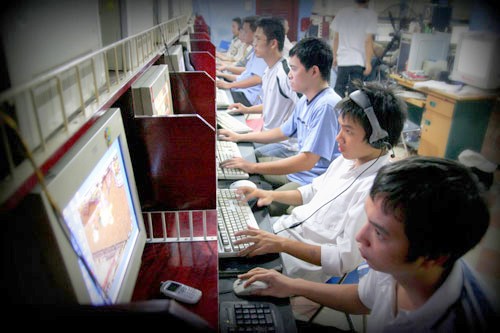(VOVworld) – Decree 72 on the management, supply, and usage of internet services and online information, which came into force on September 1, 2013, creates an important legal corridor for the healthy growth of internet in Vietnam. It’s deplorable that the US Embassy in Vietnam recently released a press communiqué on this issue and expressed an unreasonable concern over Decree 72. Is the US Embassy’s concern necessary and does it stem from the reality of freedom of speech in Vietnam?

(illustrated photo) |
One week after Decree 72 took effect the US Embassy on September 6 published a so-called press communiqué saying: “Decree 72 appears to be inconsistent with Vietnam’s obligations under the International Covenant on Civil and Political Rights, as well as its commitments under the Universal Declaration of Human Rights. We are seriously concerned over regulations in Decree 72 which seem to restrict online flows and certain forms of communication that individuals use to share information on social network accounts and websites. In addition, the Decree will restrict the development of the newly emerging information technology in Vietnam by limiting innovation, and hindering foreign investment.”
If we don’t listen to different public opinions, it would be impossible to recognize the irrationality in the press communiqué. When the press communiqué was released, Vietnamese Minister of Information and Communications, Nguyen Bac Son, explained the main points of Decree 72 in the program “People ask, ministers answer. Decree 72 includes new contents upholding the principle of development together with management. The decree encourages people to supply, seek, exchange, and share online information and promotes online information forms such as websites and social networks. The Decree creates opportunities for people to provide public information internationally in line with Vietnamese law, international practices and treaties that Vietnam signed. It also regulates the rights and responsibilities of organizations and individuals in providing and using online information and measures to protect the legitimate rights of internet users. Decree 72 is not against Vietnam’s obligations under the International Covenant on Civil and Political Rights, and its commitments under the Universal Declaration of Human Rights as the US Embassy’s press communiqué said. Minister of Information and Communications, Nguyen Bac Son said: "All countries in the world respect freedom of speech and have regulations to protect human’s freedom of speech. But no country considers this right unlimited and place it under law. Freedom of speech is protected when it doesn’t harm the nation’s legitimate interests. Because of this reason, the government issued Decree 72 which is an important decree to create a legal corridor and momentum for internet and social network development."
The US Embassy’s press communiqué expressed the concern that Decree 72 may restrict online information flow that individuals can share on social networks accounts and websites. Minister Son said: "In Decree 72, article 20 clearly defines concepts and contents of temporary websites. The Decree does not prohibit individuals to supply and share personal information in society but to ban the publication of collected information as defined in clause 3 on internal international websites and clause 5 on applicable specialized information websites. Article 23, which covers the rights and responsibilities of social network users, does not include any clause restricting people from accessing, exploiting, seeking, and sharing online information."
Decree 72 consisting of clear clauses is a tool to guide people to exercise the freedom of speech and information. So the US Embassy doesn’t have to worry about it. Unfortunately, when issuing the press communiqué, the US Embassy in Hanoi approached internet freedom in Vietnam by double standards.
Considering the case of Edward Snowden, the world knows that the US has strictly controlled internet or used this technology to serve its political and economic interests. In this context, the US Embassy praises the so-called “freedom of speech” out of Vietnamese law, saying that basic rights applied in the virtual space are like in real life and calling on the Vietnamese government to respect freedom of speech.
Like all other countries, Vietnam has laws that match international laws and national customs to boost internet growth and ensure freedom of speech. The US Embassy’s press communiqué on Decree 72 is an unreasonable intervention into Vietnam’s internal affairs. Either it is unintentional or intentional, the act has created an opportunity for some unfriendly organizations and individuals to distort Vietnam’s law.